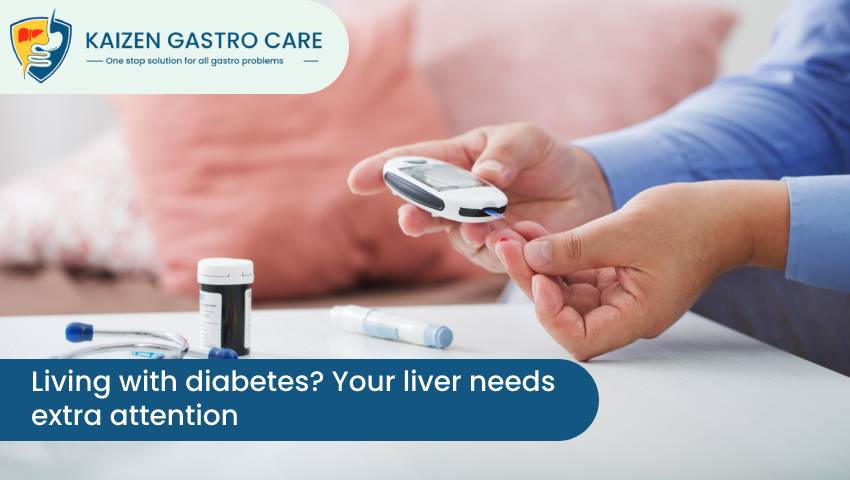
- 17/04/2023
- Kaizen Gastro Care
- 0 Comments
- Gut Health
Living with Diabetes? Your liver needs extra attention
Suffering from diabetes? Give extra attention to your liver. Diabetes is a major risk factor for Non-Alcoholic Fatty Liver Disease (NAFLD) and other liver diseases.
How does living with diabetes for a long time affects one's liver?
Living with diabetes for a long time can affect various organs and systems in the body, including the liver. The liver is responsible for filtering toxins from the blood, producing bile to aid in digestion, and regulating blood sugar levels. Diabetes can cause damage to the liver by increasing the risk of non-alcoholic fatty liver disease (NAFLD), a condition in which there is a buildup of fat in the liver. Poorly controlled diabetes can also lead to other liver conditions such as cirrhosis, a chronic liver disease that causes the liver to become scarred and eventually lose its ability to function properly. Cirrhosis can cause a range of complications, including fluid buildup in the abdomen, bleeding from enlarged veins in the esophagus or stomach, and an increased risk of liver cancer.
In addition to the direct effects of diabetes on the liver, other factors associated with diabetes can also contribute to liver damage. For example, obesity, high blood pressure, and high cholesterol levels, which are common in people with diabetes, can increase the risk of developing liver disease.
How to take care of one's liver when suffering from diabetes?
To take care of your liver when living with diabetes, it is important to manage your blood sugar levels and maintain a healthy lifestyle. Here are the simple tips:
- Controlling your blood sugar levels: High blood sugar levels can increase the risk of liver damage, so it is important to monitor your blood sugar levels regularly and work with your doctor to develop a diabetes management plan.
- Maintaining a healthy weight: Being overweight or obese can increase the risk of developing fatty liver disease, so it is important to maintain a healthy weight through diet and exercise.
- Eating a healthy diet: A diet high in saturated and trans fats can increase the risk of fatty liver disease. Focus on a diet rich in fruits, vegetables, whole grains, protein, and healthy fats.
- Limiting alcohol intake: Alcohol can increase the risk of liver disease, and people with diabetes are at a higher risk for alcohol-related liver disease. It is recommended to limit alcohol consumption to moderate levels or avoid it altogether.
- Getting regular check-ups: Regular liver function tests can help monitor liver health and detect any problems early on. it’s important to check in with your doctor on a regular basis. They can screen you for potential complications, including liver disease.
Liver disease doesn’t always cause noticeable symptoms, but it can cause serious damage. That’s why it’s so important to attend regular checkups with your doctor and follow their recommendations for liver screening tests.
